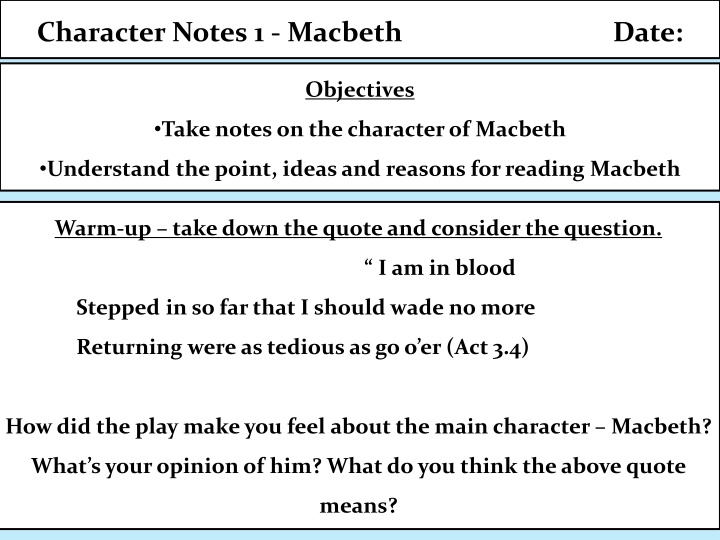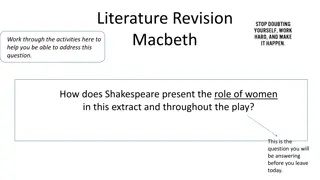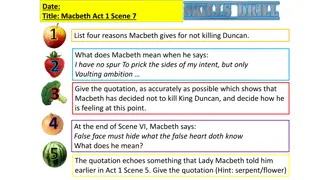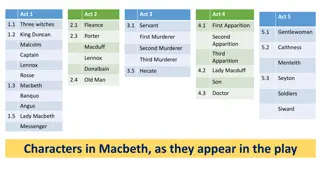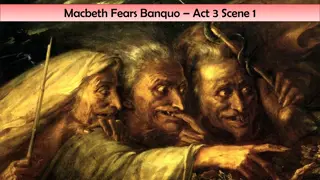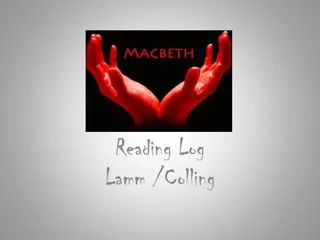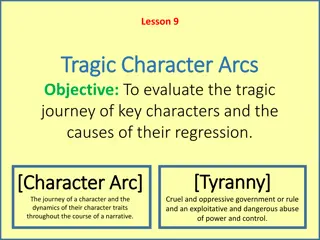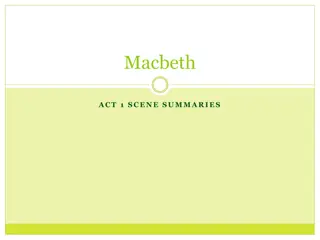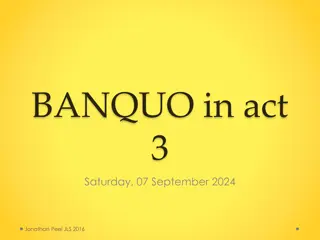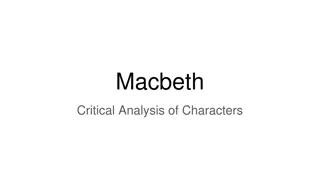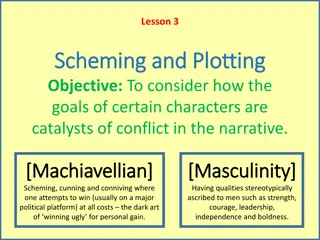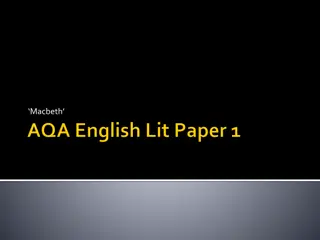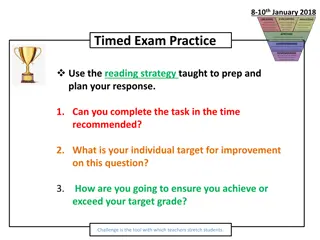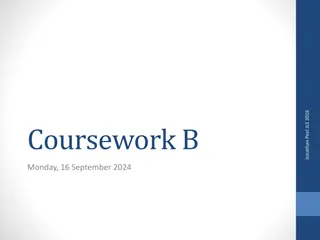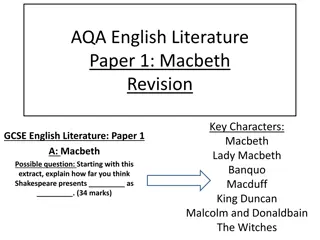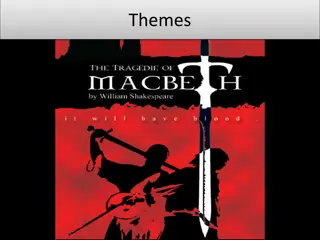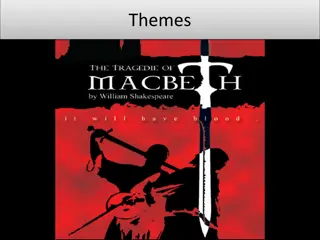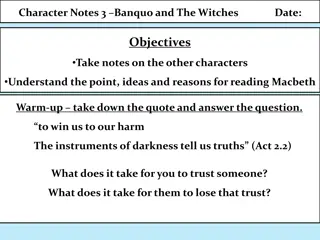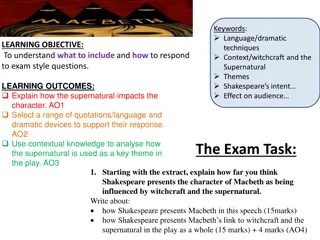Analyzing the Character of Macbeth in Shakespeare's Tragedy
Explore the transformation of Macbeth from a courageous warrior to a tyrant driven by ambition and guilt. Delve into his inner conflicts, moral dilemmas, and the influences that lead to his tragic downfall.
Download Presentation

Please find below an Image/Link to download the presentation.
The content on the website is provided AS IS for your information and personal use only. It may not be sold, licensed, or shared on other websites without obtaining consent from the author.If you encounter any issues during the download, it is possible that the publisher has removed the file from their server.
You are allowed to download the files provided on this website for personal or commercial use, subject to the condition that they are used lawfully. All files are the property of their respective owners.
The content on the website is provided AS IS for your information and personal use only. It may not be sold, licensed, or shared on other websites without obtaining consent from the author.
E N D
Presentation Transcript
Character Notes 1 - Macbeth Date: Objectives Take notes on the character of Macbeth Understand the point, ideas and reasons for reading Macbeth Warm-up take down the quote and consider the question. I am in blood Stepped in so far that I should wade no more Returning were as tedious as go o er (Act 3.4) How did the play make you feel about the main character Macbeth? What s your opinion of him? What do you think the above quote means?
Plan for today examine the character of Macbeth . 1. Introduction Addressing the question. 2. A good soldier with bad thoughts 6. Conclusion A victim or not? Macbeth 5. A Mad Tyrant 3. Ambitious but lacking resolve 4. Guilty conscious leading to madness
Macbeth Introduction The Macbeth play, written by William Shakespeare, is a tragedy. The emotion it tries to make you feel towards the protagonist is sympathy, as a great and noble warrior succumbs to one tragic flaw; ambition. Macbeth starts out as a courageous and strong nobleman, respected by all his countrymen: brave Macbeth well he deserves that name... Like Valour s minion... that Bellona sbridegroom (Act 1.2) His own strength, which links him to the goddess of war, is rewarded with honours and titles yet by the end of the play he is considered a hated tyrant. We shall now examine how and why this happened. (How important is respect to you? What would you do to win and maintain it?)
A good soldier with bad thoughts The major event which affects Macbeth is the appearance of the witches in Act 1. The question is whether they put evil ideas in his head or just reveal something that was already there. The witches prophecies only say that he will be king but rather than be excited by this news, Macbeth is troubled. He fears what he will do to make this happen: If good, why do I yield to that suggestion Whose horrid image doth unfix my hair (Act 1.3) His thoughts immediately turn to murder and ill deeds to achieve power. It is as if he has had these fantasies of taking the throne but now that dark forces have suggested it is possible, it scares him he might actually do something. (Do you understand the danger of fantasising about doing something bad? Do you understand how little a push might be needed to turn fantasy into reality?)
Ambitious but lacking resolve We learn a lot about the type of man Macbeth was from his wife. Upon hearing the prophecy for the first time, she knows he has the ambition but not the illness to do what must be done. She tells us that Macbeth lacks the ruthlessness as she says: yet I do fear thy nature: It is too full o the milk of human kindness..... (Act 1.5) He has the bad ideas but is said to be too kind, too moral and full of conscience to proceed. Really however, he just lacks resolve. He is too weak to decide on a course of action and so is easily manipulated when opportunity arises. Lady Macbeth organises the entire murder and all it takes is her questioning his manhood for him to act. (Can you measure your own resolve? What would it take to stop you?)
Guilty conscious leading to madness Macbeth did not want to kill Duncan. He listed reasons why he shouldn t, had an hallucination of a knife warning him not to do it but he suppresses his conscious and commits the crime. As a result, Macbeth is a complete mess afterwards. He returns to his wife in a state of shock, now hearing voices as he says: Methought I heard a voice cry, Sleep no more: Macbeth does murder sleep , the innocent sleep (Act 2.2) This guilty conscience and perhaps a lack of sleep leads to more hallucinations, including that of blood on his hands and ghosts of his victims. His guilt is a sign that he was a good person. (Do you know what a psychopath is? Hint ability to feel ....)
A Mad Tyrant Once he has killed King Duncan, he tries to steel himself against the guilt. He realises more evil actions will be necessary to maintain power but his wife no longer helps him. As these things don t come naturally to him however, he turns to dark forces to aid him, as he says: Scarf up the tender eye of the pitiful day.... Cancel and tear to pieces that great bond Which keep me pale (Act 3.2) Come, seeling night That bond is his humanity, his soul or whatever is responsible for feelings of any kind. To stop feeling guilty, he stops feeling anything at all. This makes him a monster, one who decides to kill his friends, kill women and children and kill pretty much anyone who poses any threat to him. (What would you do if you felt guilty?)
Conclusion: A victim or not? When Macbeth loses everything, we might feel sympathy for him. His mood swings from full of confidence to complete despair because of the witches prophecies. He realises how manipulated he was, as he says: Life s but a walking shadow, a poor player That struts and frets his hour upon the stage, And then is heard no more (Act 5.5) He feels like an actor that was told what to do; like a pawn in a game without any free will. The witches and Lady Macbeth certainly influenced him, and perhaps set him down a dark path but he was the one who walked it. Macbeth s end can be seen as a somewhat happy one then, if you consider he chooses to fight and shows no fear; thus having taken control one last time. (Once you ve read through all this notes, summarise them in your own words. Six paragraphs, 2 pages, use the quotes.)
